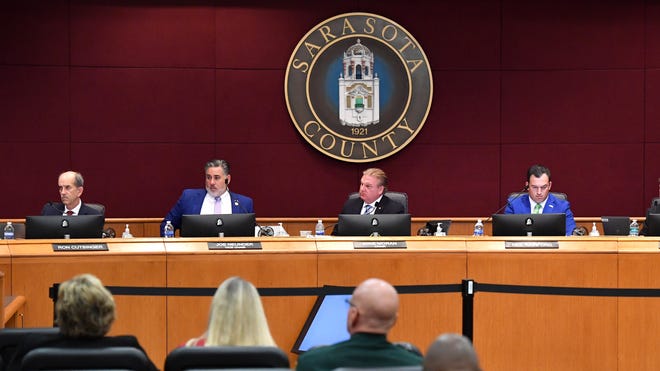Amid a child care crisis that’s impacting thousands of Sarasota-Manatee families and businesses, advocates have been busy getting the word out about a new state tax credit available to employers who support child care for their employees.
The child care tax credit bill was passed by the Legislature this session and signed into law by Governor Ron DeSantis.
The law, which goes into effect on Oct. 1, allows employers to receive tax credits by providing on-site child care facilities for their employees or by subsidizing the costs of child care for employees at qualifying facilities.
The tax credit’s launch comes shortly after the Sarasota County Commission cut child care assistance by $510,000 to hundreds of local working families.

Early Learning Coalition Educates Sarasota Businesses About Child Care Tax Credit
To spread the word about the tax credit, the Sarasota County Early Learning Coalition held an information session this summer with Florida Rep. Fiona McFarland (R-Sarasota), whose tax credit proposal was included in the bill that eventually became law.
While everyone is welcome to attend, the information session is targeted at area employers and aims to answer questions about tax credits and potentially partnering with child care providers.
“We are here to support all companies as they pioneer this new field,” said Brigid Korowis, ELC’s chief operating officer.
The next session is scheduled for 10:30 a.m. Monday, Aug. 19, at the Venice Area Chamber of Commerce, 597 S. Tamiami Trail.

How Florida’s Business Child Care Tax Credit Works
There are two ways that businesses can receive tax credits for supporting child care for employees.
First, according to an analysis by Florida Children’s Campaign, companies that provide on-site child care for their employees can receive a tax credit equal to 50 percent of the facility’s start-up costs.
The maximum amount an employer can claim as a startup credit depends on the size of the business: $1 million for 1-19 employees, $500,000 for 20-250 employees, and $250,000 for more than 250 employees.
Additionally, a tax credit of up to $300 per child per month is available for each registered child or grandchild of the employee.
Alternatively, employers can receive a tax credit by making payments to a qualified child care facility on behalf of an employee’s child (or grandchild).
These tax credits would be up to $300 per child per month (up to a maximum of $3,600 per child per year).
The types of Florida taxes to which these credits can be applied include corporate income taxes, excise taxes on liquor, wine and malt beverages, gas and oil production taxes, insurance premium taxes and use taxes under direct payment permits.
The application will be available to employers through the Florida Department of Taxation starting in October.
The need for quality child care places a burden on parents
These tax credits are among many new efforts to address an already deepening child care crisis caused by the pandemic, which has forced child care centers to close and many women to leave the workforce.
A growing body of research supports this urgency, illustrating how a severe shortage of quality, affordable child care and preschool facilities impacts children, parents, employers and the economy as a whole.
But the report says the current national model for quality child care makes the annual cost for many parents as expensive as buying a new car every year.
Educational institutions, too, are struggling with razor-thin profit margins in a highly regulated industry designed to protect young children. High capital costs for equipment, buildings, rent and mortgages make it difficult to pay enough teachers to attract them, exacerbating the shortage of places.
Meanwhile, a housing crisis has parents struggling to make ends meet before payday, Korowis said. Many of the calls to ELC are from parents who can’t afford or find quality child care or early childhood education, forcing them to stay home.
Sarasota businesses report major child care issues for employees
The effects are felt throughout the economy: A Florida Chamber of Commerce Foundation study found that the lack of child care across the state costs employers $4.47 billion annually.
Nationally, a survey conducted this spring by ELC’s Child Care Business Task Force in partnership with local chambers of commerce found that an overwhelming majority of employers report that their employees are having significant problems finding available, affordable child care, which is affecting turnover, hiring and profits.
Florida’s child care tax credit is a ‘win for everyone’
Cathy Lehner, president and CEO of the Venice Chamber of Commerce, said parents, children and employers all benefit when employers provide child care services in the workplace.
“We’re talking about how to retain employees and how to bring more talent into the workforce,” Lennar added of companies and employees. In addition to financial support for child care, there’s another immense benefit to working parents:
“Having the benefit of knowing where their children are – being able to be close by and check in – gives employees peace of mind and inspires them to be better employees,” she said.
“This is truly a win-win for everyone.”
This story is a partnership between the Sarasota Herald Tribune and the Community Foundation of Sarasota County. Sounder Amrhein covers the Season of Sharing campaign, as well as housing, utility, child care and transportation issues in the region. Contact him at samrhein@gannett.com.


